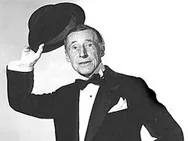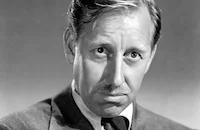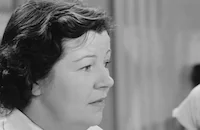Ma and Pa Kettle at the Fair
Brief Synopsis
Cast & Crew
Charles Barton
Marjorie Main
Percy Kilbride
James Best
Lori Nelson
Esther Dale
Film Details
Technical Specs

Synopsis
One summer afternoon in the small town of Cape Flattery, Ma and Pa Kettle prepare for the big summer fair. Ma hopes to win the bread- and jam-making contests to best her rival, neighbor Birdie Hicks, and to win enough money to send their daughter Rosie to college. Rosie comes home and informs her mother that college is too expensive, and that she has been trying to get a job but no one in town will employ her because they fear Pa, an inveterate "moocher," will "borrow" their goods. Pa overhears Rosie question why he is a failure, and Ma points out that any man who can support fifteen children without working is a success. Inspired by Rosie's words, Pa determines to acquire her tuition money by trying to get hit by a car in order to collect insurance, but succeeds only in causing a traffic jam. Walking home afterward, he sees Clem Johnson's old, plodding horse Emma and buys her by offering fifty percent of Ma's winnings in the fair contests. Friend and local merchant Billy Reed then approaches Pa to collect money Pa owes him, and when Billy shakes his tin of candy, Emma rears, prompting Clem to whisper to his friend Ed that Emma was once bitten by a rattlesnake and now starts whenever she hears rattling. At church that weekend, Clem's son Marvin is taken by Rosie's beauty. When the hoarse minister asks for someone to preach for him, Pa accidentally volunteers when his son's slingshot hits him. Pa delivers a moving sermon explaining that God would want everyone to work less and borrow more. Later, at the contest registration, Ma mistakenly signs up for the horse race instead of the jam competition. Ma's jam wins the contest, but she is disqualified when the judges see her entry form. As Pa and his Indian pals, Geoduck and Crowbar, attempt to train Emma for the race, Ma tries out her bread recipe inadvertently using cement powder Pa has poured into the flour jar, and is bewildered by the loaves' weightiness. When Geoduck and Crowbar send for an Indian medicine man to enliven Emma, the medicine man brings a good-luck rattle which, when shaken, sets Emma racing through town. Encouraged, Pa buys a harness from Billy in exchange for the other half of Ma's expected contest winnings. On the morning of the bread contest, Ma is completely dejected about her rock-hard bread and gives two loaves to Geoduck and Crowbar, who throw them into the horses' hay. She is slightly heartened to hear from Marvin that his father's horse, Peter J., is a champion that will almost certainly beat Birdie's entry, Dixie, and Ma spreads this news throughout the fair. When her bread, made this time with real flour, wins the contest, she credits the good-luck rattle and gives it to Pa for the race. She is frustrated but not surprised when first Billy and then Clem claim her entire winnings as their payment. As the whole town bets on Peter J., the horse eats the cement-laden loaf of bread in his hay and, by the next morning, is too sick to race. The townspeople hear of this and switch their bets to Dixie, but when the race begins, Pa shakes the rattle and Emma blazes her way to the front of the pack. In the stands, Billy explains to Ma that Emma winning will bankrupt the whole town, and she fashions a slingshot out of her garter and shoots a pebble at Emma, slowing her. Dixie wins, and although Pa is downhearted that Rosie's tuition has been lost, Billy thanks Ma. Soon after, however, the sheriff arrests Ma and Pa after he finds the cement loaves in the hay, and Birdie insists that Ma and Pa tried to fix the contest. Geoduck and Crowbar, and then Deputy Sam, try subtly to help Ma and Pa escape from the jail before Birdie raises a mob to attack them, but the Kettles are too naïve to realize that they are being helped. They remain in jail, fearing a hanging, until the sheriff calls for them to join him, Billy, Clem and Birdie. Billy explains that he has revealed Ma's act of generosity in allowing Dixie to win, and Birdie apologizes and gives Ma the prize money. Billy then informs them that he has sent a sample of Ma's jam to a grocer who now wants to carry a whole line of her preserves. Although Pa is still sad that he did not win the race, Ma explains that she could not let the townspeople lose their money, because then he would have no one from whom to borrow.

Director
Charles Barton
Cast

Marjorie Main

Percy Kilbride

James Best

Lori Nelson
Esther Dale
Emory Parnell
Oliver Blake
Russell Simpson
Rex Lease
Zachary Charles
Hallene Hill

James Griffith
Teddy Infuhr
George Arglen
Ronnie Rondell
Margaret Brown
Billy Clark
Jackie Jackson
Donna Leary
Elana Schreiner
Eugene Persson
Jenny Linder
Sherry Jackson
Gary Lee Jackson
Beverly Mook

Frank Ferguson
Syd Saylor
Harry Harvey
Frank Wilcox
Harry Cheshire
Nolan Leary
Wheaton Chambers

Harry Cording
William Gould
Frank Mcfarland
Dick Ryan
Sara Taft
Claire Meade
James Guilfoyle
Bob Donnelly
Harold De Garro
Mel Pogue
Doug Carter
George Eldridge
Lester Dorr

Margaret Bert
Elsie Baker
Helen Gibson
Jack Harden
Roy Butler
Juanita Close
Emily Marks
Donald Kerr
John Barton
Philo Mccollough
Sidney Mason
Forrest Taylor
Roy Regnier
Edmund Cobb
Hal Smith
David Newell
Lois Austin
Crew
Leslie I. Carey
Frederick De Cordova
B. Reeves Eason
Russell A. Gausman
Joseph Gershenson
Jack Gertsman
Maury Gertsman
Leonard Goldstein
John Grant
Jack Henley
Bernard Herzbrun
William Holland
David S. Horsley
Corson Jowett
Ted J. Kent
Wally Kirkpatrick
Ruby Levitt
George A. Minor
Richard Morris
Rosemary Odell
Eric Orbom
Martin Ragaway
Jack Rixey
Ronnie Rondell
Lee Sholem
Joan St. Oegger
Leonard Stern
Bud Westmore

Film Details
Technical Specs

Articles
Ma and Pa Kettle at the County Fair
The plot thrust of Ma and Pa Kettle at the County Fair comes from Ma and Pa's determination that eldest daughter Rosie (Lori Nelson) receive a college education. Ma takes the attitude that she can raise Rosie's tuition by besting Birdie Hicks (Esther Dale) at the various cook-offs at the upcoming county fair; Pa, showing his unique brand of pragmatism, sets off to get himself struck by a car in order to collect on insurance. Once that fails, he gets the bright idea to enter the fair's horse race; with no entry, Pa offers Clem Johnson (Russell Simpson) half of Ma's fair winnings in exchange for Clem's broken-down nag Emma.
While it looks at first that Pa has stepped in it again, it turns out that the snake-traumatized Emma takes off like a shot at the sound of a rattle. The encouraged Pa stakes the other half of Ma's winnings to Billy Reed (Emory Parnell) in exchange for a harness. Come the fair, further shenanigans ensue, including Pa's substitution of cement for baking powder in Ma's bread dough, and an accusation against the Kettles of fixing the race in their favor.
Nelson, the Universal contract starlet best remembered as the heroine-in-peril in Revenge of the Creature (1955), reprised her role as Rosie in Ma and Pa Kettle in Waikiki, and shared fond memories of her screen parents for the fan webzine The Astounding B Monster. "They were pretty much the same characters they played on the screen," the actress reminisced. "He was a very intelligent man, however. Very quiet and sweet. Marjorie was rough and gruff and boisterous."
In her extensive biography Marjorie Main, Michelle Vogel cited a 1947 interview with the actress on how she created the characterization that earned the sole Best Supporting Actress Oscar® nomination of her long and distinguished career for The Egg and I. "I read the script as well as [Betty MacDonald's] book a dozen times. I designed Ma's clothes and bought the materials myself in cheap Los Angeles department stores. I picked up hats from the studio's wardrobe department and altered them to fit Ma's appearance. I figured out the owl's nest hairdo, calling on my girlhood memories of hundreds of overworked farm wives back home in Indiana".
The factors behind the Kettles' popularity and down home charm were not lost on a reviewer for the New York Times upon the opening of Ma and Pa Kettle at the Fair. "The surprising thing about the film, as has happened before, is that Pa and Ma Kettle somehow manage to survive this contrived tomfoolery as characters rather than caricatures," stated the review. "Could be Mr. Kilbride's rock-hewn quietness or the kindliness underlining Miss Main's leathery grimacing. At any rate, one sequence in which Mr. Kilbride delivers an impromptu sermon is both touching and genuinely amusing, two qualities that may yet make the Kettle family synonymous with something more than a ticket stub."
Producer: Leonard Goldstein
Director: Charles Barton
Screenplay: John Grant, Richard Morris; Jack Henley, Martin Ragaway, Leonard Stern (story); Betty MacDonald (characters, uncredited)
Cinematography: Maury Gertsman
Art Direction: Bernard Herzbrun, Eric Orbom
Music: Frank Skinner (uncredited)
Film Editing: Ted J. Kent
Cast: Marjorie Main (Ma Kettle), Percy Kilbride (Pa Kettle), James Best (Marvin Johnson), Lori Nelson (Rosie Kettle), Esther Dale (Birdie Hicks), Emory Parnell (Billy Reed), Oliver Blake (Geoduck), Russell Simpson (Clem Johnson), Rex Lease (Sheriff).
BW-78m.
by Jay S. Steinberg

Ma and Pa Kettle at the County Fair
Quotes
Trivia
Notes
The working title for this film was Ma and Pa Kettle at the County Fair. According to a January 22, 1951 Hollywood Reporter news item, director Charles Barton's wife died during the production of Ma and Pa Kettle at the Fair and he was temporarily replaced by Frederick De Cordova. A Hollywood Reporter news item also notes that the horse racing scenes were shot at Devonshire Downs racetrack in the San Fernando Valley, CA. Although Hollywood Reporter includes Ralph Peters in the cast, his appearance in the final film has not been confirmed.














